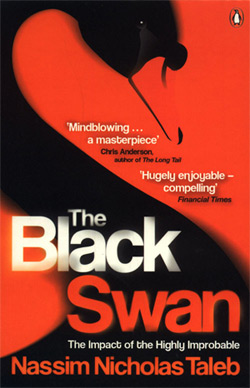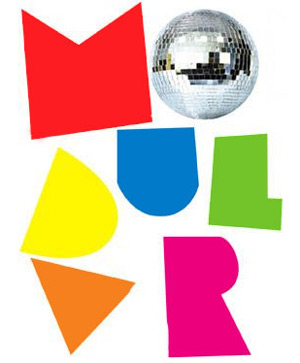Cumulative Advantage and Social Currency
A straightforward online exchange: Matt Granfield tweeted a link at @waycooljnr, the Twitter account I run with Nick Crocker for music and marketing links. It was an interesting link worth sharing, so I thanked Matt via Twitter and left a comment on David Gillespie‘s blog post.
Simple, right? And, at first glance, pretty nerdy, especially when I describe what took all of 30 seconds. But it got me thinking about what is, in my mind, the real value of social networking: shortening the distance between people.
 For the last couple months, I’ve been reading a book by Nassim Nicholas Taleb called The Black Swan. I’m not going to feign complete comprehension, as frankly, it’s the most challenging thing I’ve read since Robert Greene‘s 48 Laws Of Power, which took me over a year to absorb.
For the last couple months, I’ve been reading a book by Nassim Nicholas Taleb called The Black Swan. I’m not going to feign complete comprehension, as frankly, it’s the most challenging thing I’ve read since Robert Greene‘s 48 Laws Of Power, which took me over a year to absorb.
Among many taxing topics, Taleb discusses the ‘Matthew effect‘, otherwise known as cumulative advantage. It’s the concept whereby it’s easier for the rich to become richer, and for the famous to get more famous:
This theory can easily apply to companies, businessmen, actors, writers, and anyone else who benefits from past success. If you get published in The New Yorker because of the color of your letterhead or attracted the attention of the editor, who was daydreaming of daisies, the resultant reward can follow you for life. [p. 218]
The earlier Twitter exchange allowed me to bridge the gap between that concept and social networking. Put simply: the more you interact with someone online before you meet them, the greater the chances that you’ll get what you want for them, be it friendship, mentorship, or a job.
Let’s run with the third option. Picture two undergraduate job candidates. One spends his days at university and his nights on the couch watching television. The other spends his days at uni and his nights online, reading blogs, participating in relevant industry conversations via social media, and identifying local influencers within the industry he hopes to begin a career.
An ideal employer advertises a junior role. Until they shake hands at the interview, Dude #1 is nothing more than a resumé and a cover letter to the employer. But Dude #2 has been sharing valuable links and commenting on the company’s blog, so he strikes an easily rapport with the employer based on their mutual interests and knowledge. Their social currency.
Which one’s going to get the job? [An aside: I’m as surprised as you that I autopiloted into a university-based thought exercise, given my past admonishment of its worth.]
Okay, the scenario’s not applicable to every industry. A chemistry undergraduate would find it less pertinent than a web designer. But hell, everything’s online these days. It kinda blows my mind that so many people still don’t get this.
 I’ve been online for like 10 years, and I’m only just beginning to consciously pay attention to this stuff. Cumulative advantage dictates that the more time you spend online building meaningful relationships and contributing to the internet, the easier it’ll be to get what you want.
I’ve been online for like 10 years, and I’m only just beginning to consciously pay attention to this stuff. Cumulative advantage dictates that the more time you spend online building meaningful relationships and contributing to the internet, the easier it’ll be to get what you want.
At the top, I wrote that it was kinda nerdy to describe a Twitter interaction. But when you’re using these tools to establish yourself as an influencer within the industry you’re passionate about, well, who the fuck cares if it’s nerdy? You’re winning.
One of Australia’s top indie record labels today advertised a job via Twitter. You wouldn’t hear about that while watching television, would you?
Three quotes occurred as I wrote this. The last one’s the most important.
Ryan Holiday, December 3 2007:
[If I was starting all over again today]l I’d become a personal RSS reader for one or two of the big bloggers. “You’ll like this article.” “Do you read this blog? He hits a lot of the same themes that you do.” “I’m hearing rumors that ____ is going to acquire ______, just wanted to give you a heads up.” And I would tailor the results for that person based on what I know they like. I would kill myself doing it. Every day, 5-10 articles. And then I would start to integrate commentary or questions. Become the guy that they get their information from, the person that keeps them connected to the pulse. Maybe one week I’d take a break and send nothing, just to highlight the difference. The ultimate end game being that they would start to send you out to find things for them: “What can you tell me about ________” Yes, you’re a research bitch but in the end, you come away with something that even the person you’re serving doesn’t–not just a vast reserve of knowledge but the ability to find out where it is coming from.
Ryan Holiday, June 11 2008:
One day you’ll probably want something from the internet – you’ll have a book to promote, a business that needs customers, someone you need to meet, an ebay auction you’re trying to sell, a job you’re after. It’ll be too late then. You have to start before. And there’s only one way to do that.
Tait Ischia, April 17 2009:
You have to prove to business owners that you are good and that you’ll make them money. And of course the best way to prove it is by doing stuff. Blogs are the easiest way to do stuff. It’s basically like maintaining a Facebook but isn’t a complete time-wasting exercise in vanity. If all the kids these days spent the same amount of time writing blogs that they did on Facebook, then [the advertising] industry would be a hell of a lot more competitive.
I love the thought patterns here – thanks for sharing :)
Or perhaps none of this has anything to do with the fundamental incomputability of the probability of consequential rare events, and it’s just a matter of not what you know, but who you know…
Maybe, Matt. But it’s fun to think of alternatives.
I’m adopting ‘The Matthew Effect’ though.
Nice Post. I have thought along similar lines many many times.
Have a read of Taylor Davidson’s blog and his post:
“Social capital isn’t new, but everything about it is.”
Great read and with great resources at the bottom.
http://www.unstructuredventures.com/uv/2009/01/16/social-capital-is-not-new/
Cheers matey,
Eddie
Very well-put. You make some of the more complex ideas here read very straightforward, and without making me feel like an idiot for avoiding social media for the past four years…
This sort of post gives me the motivation to put more work into blog writing. Thanks!
Or as Muhammed Ali (I think) put it: The harder I work, the luckier I get.
Good to hear that The Black Swan is worth persevering with. I keep doing a chapter then getting distracted by shinier things.
Cheers,
Tim – Mumbrella
Trackbacks for this post